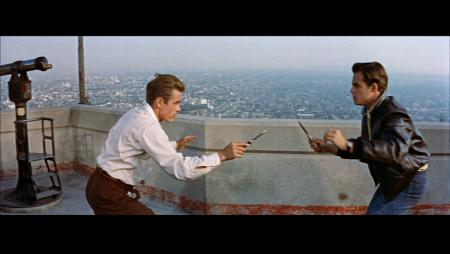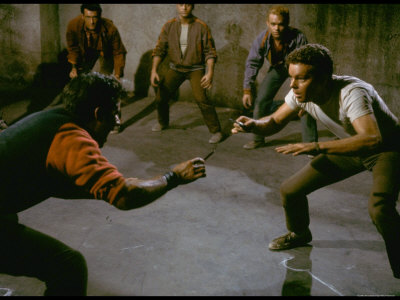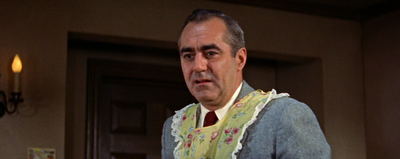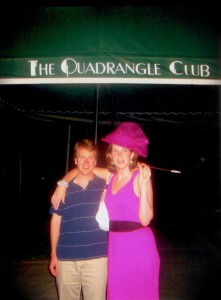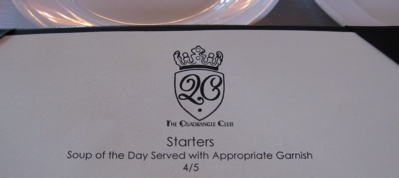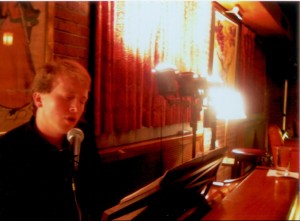Fanfare Magazine’s review of the American Chorale Premieres CD has just come out, penned by one Jerry Dubins. It’s not much of a review, and I’m guessing that very few people will actually read it outside of the Cedille Records administration and Choral Music Junkies (if such things actually exist), but I simply must take issue with Mr. Dubins’ overall critical approach.
First off, let me just say that this is not an argument against his “review” of my piece. In fact, he doesn’t really review my piece as much as offer a vague and vaguely dismissive semi-description of the music sprinkled with biographical misinformation (I’m well known in the Roman Catholic community? For my choral music? When did that happen?) Since he doesn’t even attempt to figure out what my piece is about compositionally, there’s not much that I can respond to.
Where I really take issue is with his review of Egon Cohen’s Stabat Mater. In the interest of full disclosure, I do know Egon, as we were both students of Easley Blackwood at the same time, and I would list him as an acquaintance – not exactly someone I would rush to defend under most circumstances. I do quite like his piece on this disc, but that’s neither here nor there. Here’s what Mr. Dubins had to say:
Finally we come to Egon Cohen (b. 1984), the youngster among this assembly. His Latin-titled Stabat mater set in English translation was written in response to an invitation to submit a piece for this CD. The music effectively captures the doloroso character of the text; but it does give me cause to wonder why a young, Jewish composer would be drawn to this deeply Roman Catholic 13th-century sequence that meditates on the suffering of the Virgin Mary. Surely, as Rochberg and many other Jewish composers have, Cohen might have found an equally moving text from the Hebrew liturgy.
Um, Excuse Me? You wonder why he couldn’t find a Hebrew text? That so clearly falls into the category of None of Your Goddamn Business. Would Mr. Dubins conclude a review of Mendelssohn’s Christus by asking the same question? How about Max Bruch’s Kol Nidrei? How about John Adams’ A Flowering Tree, for that matter? Any critic who can’t understand that a composer might possess a vivid enough imagination to think outside of his closest cultural boundaries is truly wanting and kind of missing the point of a vast swath of artistic output.
I have no way of knowing if this Jerry Dubins is himself Jewish, and is perhaps a Yenta-ish figure of some sort, bemoaning the fact that a member of his tribe couldn’t meet a “nice Jewish text”. Even in that case, I don’t really think that a music criticism magazine is the best venue for such an opinion.
Call me crazy, but I kind of think it’s a critic’s job to get inside the piece, whether or not it be his cup of tea. David Effron, my conducting teacher, tells us that it’s our job to love any piece of music that we’re conducting. Well, clearly it’s not the critic’s obligation to love everything he reviews, but I do think that a decent critic loves the process of delving in deep and trying to take a piece on it’s own terms.
This is where so many of the critiques of Inglourious Basterds go wrong. I’d say about 90% of the reviews fail to penetrate the surface, or at least the immediate sub-surface level, even some of the more sophisticated ones. For example, take Stephen Rea’s review in the Philadelphia Inquirer:
Tonally schizoid and rife with anachronisms (a David Bowie song on the sound track, out-of-era vernacular), Tarantino’s Third Reich folly is utterly exasperating.
Umm… “rife with anachronisms” is as far as you got? OK, fine, this is a particularly shallow analysis, but most of the reviews don’t get past listing the many genre references that pervade the film. Almost none of the reviewers get to the heart of how QT uses the genres artistically. To me, the Big, majorly subversive element of the film [oh, btw, spoilers a’plenty follow] is not so much QT’s re-writing of history, but in how this interacts with our pre-conditioned genre expectations. Because of films from The Longest Day right up through Saving Private Ryan, we the viewers damn well expect realism from the WWII genre — it’s almost like an unwritten moral code. Even in more fictional WWII films, the details of an individual squadron or battle or whatever may be made up, but the outcome is always the same.
Tarantino absolutely knows this, and that’s why the third act of his film has tension — because the viewer is sitting there wondering “How is this plot going to fail?“. Now, the problem is that that’s really the only reason why the third act has tension — there’s very little internal to the movie to make you yearn for the success of the grueling finale. Within the film, the American “Basterds” are depicted as way more brutal than any of the Nazis, and the character of Hitler is imbued with a Mel Brooks-esque buffoonery; Tarantino is relying completely on the viewer’s personal sense of history to justify his (Tarantino’s) violent end to the Third Reich.
I’ve got a feeling that there might be a much, much deeper message here, that Inglourious Basterds is an Anti War Film – that is, both an Anti-War Film and an Anti War-Film, if you know what I mean.
So Jerry, what’d you think of the movie?
